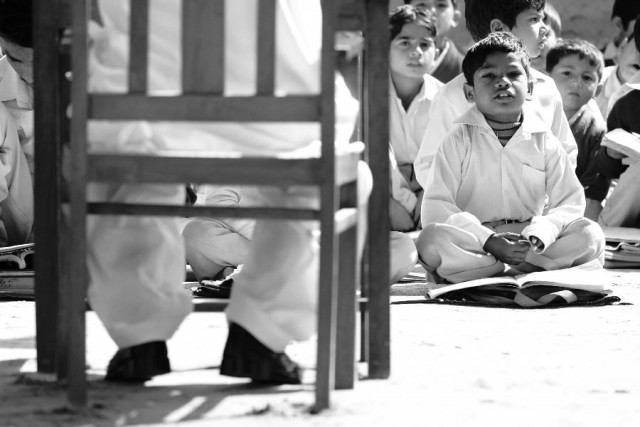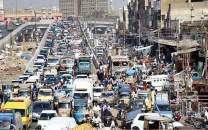Problems aplenty: Examining effects of Sindh’s ‘education emergency’
Despite its bifurcation, many education dept schemes still on the backburner

Pakistan is suffering an education emergency, with at least 25 million children denied their constitutional right to an education. PHOTO: FAYYAZ AHMED/EDUCATIONEMERGENCY.COM.PK
However, the difference in the number of schools and colleges is so vast that the burden the CM tried to ease by bifurcating the department has not been alleviated. Sindh has 46,039 public primary, middle and secondary schools, while the number of colleges in the province is only 271.
Talking about the difference the education emergency declaration has made, school education secretary Fazlullah Pechuho said the situation is more or less the same. "I was looking after schools and colleges before the split and after the division I have only been relieved of looking after 271 colleges, while more than 46,000 schools are still on my head," he said, adding that the major problem in education was of primary schools for which the department is trying to bring reforms.
Despite the changes in the ELD, the status of the new and ongoing projects in the department has not seen any changes; many of the schemes remain untouched and unapproved. This year, there is little difference in the ELD as some schemes might have been started on paper but the actual physical work has not begun yet. Some schemes in the budget awaiting completion are multi-purpose halls, an office building for Chinese language education, ILMI (ELD's messaging complaint cell) infrastructure development, Cambridge schools scheme and new appointments.

Allocation for the ELD in the Annual Development Programme (ADP) 2016-2017 was increased by Rs3 billion as compared to the previous year with millions of rupees allocated for various ongoing and new schemes. However, many of the schemes have not seen the light of day. According to the secretary, 80% of the budget was allocated for ongoing projects, while 20% had been fixed for new schemes across the province.
Multi-purpose halls
A project that has been in the 'new schemes section' for the last two years is the construction of multi-purpose halls or career development centres for examinations. The project, which was left unapproved in the 2015-2016 fiscal year, was added in the new schemes in 2016-2017.
In 2015-2016, the project was estimated to be completed by June, 2018, at a cost of Rs700 million in three cities - Sukkur, Shaheed Benazirabad and Larkana. The 2016-2017 budget statement only lists one hall in Sukkur to be constructed at a cost of Rs697 million and is estimated to be completed by June, 2017.
Talking about the status of the project, Pechuho said that the project's approval is still pending in the planning and development department. The scheme was designed to help put an end to cheating and improving the examination process in Sindh, he said. The halls can cater to 10,000 to 15,000 students and will replace the traditional examination centres used for matriculation and intermediate annual examinations.
Cambridge school scheme
One of main projects in the education budget for the past few years is the establishment of English-medium schools in Sindh with the Cambridge system from nursery to O Level. The project was approved in 2013 but until now only five of the proposed 25 units have been completed. The current target date for completion of the project is June, 2017. Previously it was June, 2015.
Earlier this year, Pechuho had told The Express Tribune that 20 of the 25 approved schools will be completed by December 31, 2016. Last year, he had claimed at least 16 schools would be completed by March, 2016, but after the project director, Sattar Jatoi, left, the scheme seems to have stalled. The schools that are in completion stages now are in Naushero Feroz, Thatta, Larkana and Sukkur while the pilot campus in Nawabshah was completed in 2015. "Work on the buildings is ongoing and four of the campuses have been completed or are in the final stages," he said.
ILMI infrastructure development
In order to develop its infrastructure system, six ILMI infrastructure development centres are to be set up in different divisions of the province. Each centre will cost Rs40 million and are to be completed in June, 2018. The centres will be established in Hyderabad, Mirpurkhas, Shaheed Benazirabad, Sukkur, Larkana and Karachi.
Pechuho said that the process has been delayed because of delays in the recruitment process on the Sindh Public Services Commission's end as the commission was suspended on the orders of the Supreme Court. The CM has approved the formation of an ILMI cell but work cannot be done until the recruitments are done, the secretary explained.
Chinese language education
Another new scheme was the purchase of a building for the Chinese language programme in Karachi, which was approved in 2015. Chinese language trainers will also live in the building. The other issue in this regard is to hire sufficient trainers to educate Chinese-language teachers at the schools.
Published in The Express Tribune, November 28th, 2016.



















COMMENTS
Comments are moderated and generally will be posted if they are on-topic and not abusive.
For more information, please see our Comments FAQ